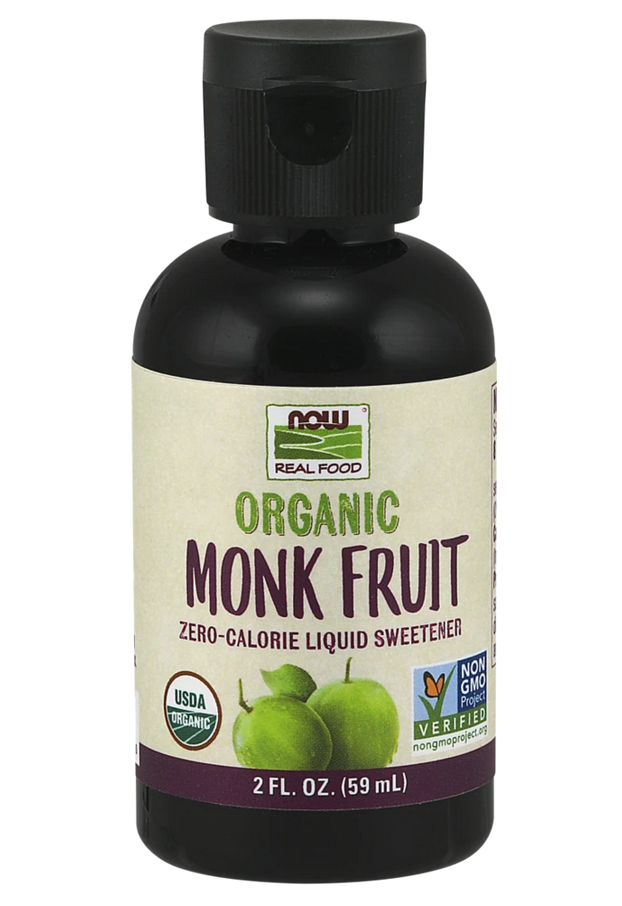
The Monk Fruit
Have you ever heard of monk fruit?
The name monk-fruit is funny-sounding, isn’t it?
When I first heard of monk fruit a vision of an orange in a brown robe popped into my head.
Turns out monk fruit is a small, greenish-colored gourd that hails from Southeast Asia and is nothing like an orange…
Well, I’m getting ahead of myself here, it is like an orange in that it is sweet like an orange. It’s unlike an orange in that the sweetness it delivers can be isolated into a powder or a liquid and serve as a 0-calories option to replace sugar.
How sweet is it?
150-200 times sweeter than sugar. And yes, it really has 0 calories, 0 carbohydrates, 0 sodium, and 0 fat.
I’m going to write a little bit about monk fruit as we’ve been selling it in our store for several years and we’ve included it in our Ketox shake ever since creation.
I’ll give you a link to purchase it if you’d like in a moment, but first I’m going to talk all about the benefits this great-tasting 0-calorie sweetener supplies.
6 Benefits Associated With Monk Fruit
Monk fruit’s positive characteristics mean that it may help with various aspects of health.
Many of these areas of health when affected positively can help lead to a more enjoyable life.
So, without further ado, let’s talk about how Monk Fruit can help those who take it.
1 - It can help you lose weight:
Part of the reason Americans are so incredibly overweight has to do with how much sugar we consume.
The good news is switching from sugar to monk fruit (yes you can bake with it), may help people lose significant amounts of weight.
“A 2016 study published by the Journal of Pharmacology and Experimental Therapeutics illustrated that mogrol component in monk fruit inhibited the differentiation of pre-adipocytes (pre-fat cells) into mature adipocytes (fat cells), which significantly minimizes the ability of the body to add general fat mass.”
2 - It helps with inflammation support:
Sweeteners are rarely thought to be helpful in helping with inflammatory support, but it seems to be that the monk fruit may help to keep your body inflammation under control.
As Dr. Mercola writes:
“A 2011 study revealed that monk fruit was used in TCM to make hot drinks that may address sore throat and reduce phlegm.
Mogrosides, which are natural compounds responsible for the fruit’s sweetness, are said to [support inflammation] and assist with [helping maintain] blood sugar levels.”
3 - Can help act as an antioxidant:
Monk fruit contains nutrients known as mogrosides that are actually the components within the fruit that contribute to its sweetness (correct, it’s not the sugars from monk fruit that make it sweet) and mogrosides have the ability to scavenge for and potentially act against free radicals
No human studies on how these mogrosides interact with human cells has ever-been conducted, but mogrosides are known antioxidants.
4 - Can help support the immune system:
Monk fruit contains one of the more potent immune-supporting nutrients documented.
Vitamin C.
While it loses some of that vitamin C content during processing, there’s likely enough remaining in the liquid or the drops to provide you with some of the immune-supporting benefits it's known for.
Vitamin C has been observed to help activate the immune system by helping to stimulate how many white blood cells the body makes as well as assisting in the production of collagen, which you need to help in the creation of muscle cells, blood cells, and more.
5 - Helps keep blood sugar normal:
Like with many all-natural, 0-calorie sweeteners, this one has a tremendous effect on blood sugar in that it doesn’t affect it.
Sugar and other sweeteners with calories in them, generally cause blood sugar levels to rise and fall after intake.
Monk fruit will not do that.
For people whose blood sugar levels swing wildly thanks to dietary intake of sugars (especially in drinks and baked goods), replacing sugar with monk fruit can lead to better blood sugar levels in the future.
6 - Could boost energy levels:
It may be surprising to hear, but a sweetener like monk fruit might actually help re-energize you (and keep you energized).
Dr. Axe writes:
“In a study on mice, monk fruit extracts were successful in decreasing fatigue in exercising mice. The study was able to reproduce the results and prove that mice given the extract had extended exercise times.
This study provides evidence as to why monk fruit has long been referred to as the “longevity fruit”.
Plus…
If the benefits you just read about tickle your fancy and make you want to start using it, then consider this.
Monk fruit is also:
- Affordable
- Tolerated by most (allergy levels are low)
- Great tasting
- Easy to use in drinks and baking
- Side-effect free
And more.
I think most people will benefit from using it in baking or beverages.
Better yet is because it’s so much sweeter than sugar, you don’t need much to replace your sugar consumption.
NOW Foods has a great bottle that’s organic, and extremely affordable.
1 bottle will last you months. You can get yours here.




